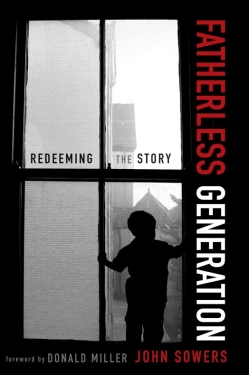Feeling the Pain of a Fatherless Generation: Forgotten Fairy Tales
 Last week, I discussed how the pain of fatherlessness tends to affect boys — by leading them towards a life of anger and/or passivity. To combat this, we need to reach boys with other men, with a language for authentic manhood, and with healthy outlets for their energy.
Last week, I discussed how the pain of fatherlessness tends to affect boys — by leading them towards a life of anger and/or passivity. To combat this, we need to reach boys with other men, with a language for authentic manhood, and with healthy outlets for their energy.
John Sowers, in Fatherless Generation, also discusses how an absent dad affects girls. Note that this absence is especially true when Dad is physically absent, but the bigger effect is because Dad is emotionally absent from their lives.
For girls, the loss of Dad means the loss of a man to teach her what true love is, and how she should receive it.
A Forgotten Fairy Tale
“Around 750,000 teenage girls will become pregnant this year. Seventy-one percent of these pregnancies will be from fatherless homes.” That “fatherless” is not talking about the guy who impregnated the teenage girl, but that the teenage girl has no Dad who was connected to her life in a positive way.
This is not the fairy tale or dream that a little girl has in her head, to become pregnant as an unmarried teenager or twenty-something. But, “without Dad’s affirmation, daughters grow up struggling with their sense of worth. They feel deficient, that something is lacking.” Because these girls are starved for the love they should be receiving from Dad, they crave attention, affirmation, and approval from others, especially from boys. And whereas boys’ use “love” as a means to get sex, girls use sex as a means to attain love.
Just as there are long-term, generational effects for fatherless boys (mostly in the form of failed jobs and relationships), the same is true with young girls that become unwed mothers. In Allendale County in 2005, 38% of babies were born to mothers with less than a high school education, and 25% of babies are born to teenage mothers, according to this report from Allendale County First Steps. The report explains, “Teenage parents often lack the maturity and knowledge required to optimally fulfill important parental responsibilities.”
A child born in this situation already has the odds against him. Sowers writes,
“Approximately two out of three babies born to unmarried teens . . . are now living in poverty. In contrast, only 7 percent of children born to married high school graduates aged twenty or older are living in poverty.”
So, we have a strong correlation between father absence and unwed pregnancy, and then between unwed pregnancy and continuing in a life of poverty. A recent article in the Economix states that the areas that have the most income inequality (i.e., a bigger gap between the have’s and the have-nots) have higher teenage pregnancy rates. In those areas, those in poverty more quickly perceive the lack of hope and opportunity.
The fairy tale is dead, because — as Kathleen Parker writes in An Illegitimate Culture — there is no father holding the shotgun.
Do We Have a Crisis?
A friend of mine, looking to serve in Allendale, asked, “Is there a crisis pregnancy center around?” Not that I’m aware of, I answered, but I’ll try to find out.
The bigger problem is, unfortunately, that pregnant teenagers are not overwhelmingly seen as a crisis to many in this community. It’s something “not great” maybe, but not a true crisis. So, a teenage girl has a baby, and is back in school a few months later, being applauded that she is back to her skinny body.
Another friend (from this area her entire life) and I were sitting together at a high school basketball game, and we both noticed the number of young moms with their less-than-a-year-old babies. Not including the moms with toddlers, we probably saw fifteen to eighteen young moms with babies. Even worse, half of these girls were wearing tight and revealing outfits. “Isn’t that how it all started?” I asked my friend.
I almost wish there was more of a stigma among the teenage females in the Allendale.
What’s Next?
As I said, we need to reach boys to help them grown in authentic manhood. But we cannot ignore the girls, of course. If there is no Dad that will provide and protect them, we need other mentors (men and women) who can do that. Girls need to know that they are approved and valued, so that they will not crave attention from boys who are only focused on their own satisfaction.
We need men and women to protect the futures of these girls, so their fairy tale dreams do not turn into nightmares.
Related Links:


Trackbacks / Pingbacks